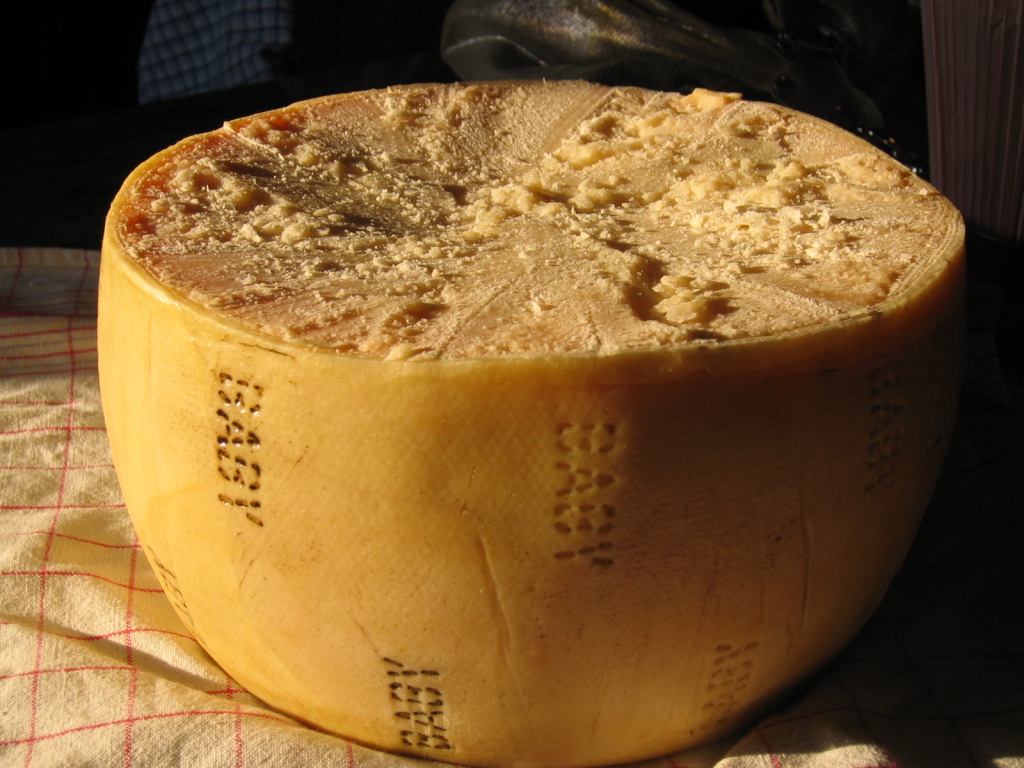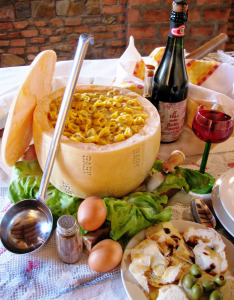 A mini-cheese whose weight is 5/6 kilos, with great quality characteristics: this is a simple, but brilliant idea born in the Eighties in the Moscattini family, on the hills of Maranello (Modena), where the dairy tradition is related to the famous Italian cheese Parmigiano Reggiano. It was a success from the beginning. Its typical flavour, combined with practicality and small dimensions, allows ‘Baby’ to become a main character in the best local restaurants, wine shops, and cafés, beyond national boundaries, too.
A mini-cheese whose weight is 5/6 kilos, with great quality characteristics: this is a simple, but brilliant idea born in the Eighties in the Moscattini family, on the hills of Maranello (Modena), where the dairy tradition is related to the famous Italian cheese Parmigiano Reggiano. It was a success from the beginning. Its typical flavour, combined with practicality and small dimensions, allows ‘Baby’ to become a main character in the best local restaurants, wine shops, and cafés, beyond national boundaries, too.
An increasingly demand
The main features of the Baby Moscattini cheese are the characteristic flavor and aroma that become more intense with the various stages of maturation. All stages of production, beginning from the production of milk, are made inside the company. Carlo Alberto Moscattini, one of the owners, explains: «In this little ‘pearl’ of cheese, we are able to sum up flavour, scent, and aromas, enclosing all the flavors of Emilia tradition in the production of cheese, by using only milk, rennet, and salt, and all this in a natural way, without preservatives». 10.000 Baby cheeses are produced every year by Moscattini and the demands are continuously increasing. «Baby is very popular thanks to its pleasant and practical look, suitable for every circumstance and occasion. However, we receive the most important demand by companies that use it as a present for their customers, as well as restaurants, catering, wine shops, and private citizens who want to surprise their guests with an exclusive and innovatory product from all points of view.
 Baby has the characteristics of all the other aged cheese produced in Emilia and for this reason it goes well with the myriad of recipes proposed by Modena’s cooking. When it is still fresh, it is soft, delicate, and can go well with appetizers, if served in slivers on toasts, combined with either honey or aromatic vinegar. It is also excellent on meat-based second courses, such as thinly sliced beef and thin slivers of Baby, which must be added when the course has been cooked, just before serving it. When it is ripe, it is scented, with an intense flavour and is used for preparing filling for ‘tortellini’, ‘ricotta tortelli’, lasagne, or simply grated on pasta with tomato sauce. Its consistency allows using its shape, voided of its cheese, as an original soup tureen which, besides keeping heat, flavours the course contained in it.
Baby has the characteristics of all the other aged cheese produced in Emilia and for this reason it goes well with the myriad of recipes proposed by Modena’s cooking. When it is still fresh, it is soft, delicate, and can go well with appetizers, if served in slivers on toasts, combined with either honey or aromatic vinegar. It is also excellent on meat-based second courses, such as thinly sliced beef and thin slivers of Baby, which must be added when the course has been cooked, just before serving it. When it is ripe, it is scented, with an intense flavour and is used for preparing filling for ‘tortellini’, ‘ricotta tortelli’, lasagne, or simply grated on pasta with tomato sauce. Its consistency allows using its shape, voided of its cheese, as an original soup tureen which, besides keeping heat, flavours the course contained in it. Hand-crafted packaging
Baby combines well with a myriad of recipes and its consistency allows using its small shape, voided of its ‘heart’, as an original soup tureen. It is widely used as a gift for important occasions. As for this, the company offers a versatile packaging, so allowing the customers to personalize with their name both packaging and cheese. Moscattini explains: «The packagings we use are simple and hand-crafted, realized with natural raw materials, which reflect our product. They are boxes in either wood or cardboard, branded, on which we communicate important ideas, such as our Baby Moscattini trademark as well as production lots, besides our intrinsic message that for us quality, tradition, history, and simplicity are the constitutive elements of our cheese. Packaging is certainly important, but we are still convinced that finding a good product in a nice packaging is even more important!».
